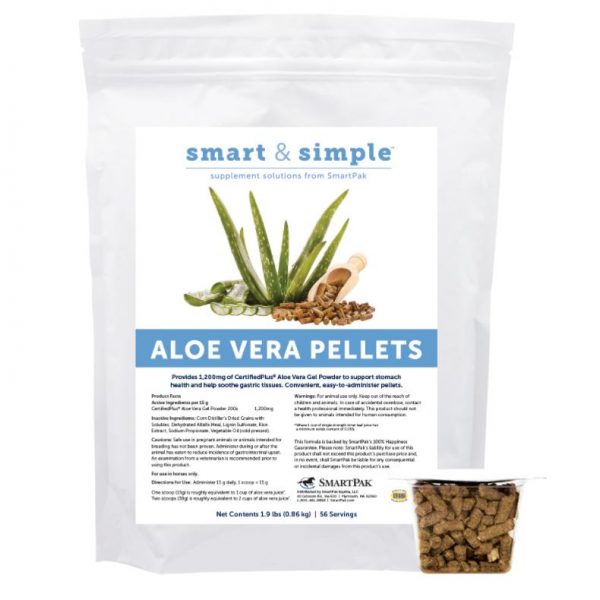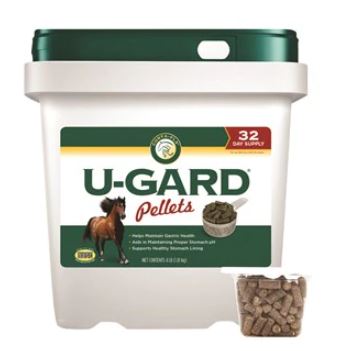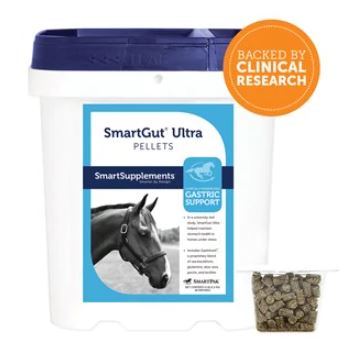Gut Health for Horses - Top Picks to Support Stomach Health
Your horse’s stomach plays a critical role in digestion, but the impacts of gastric health don’t stop at feed utilization. An unhealthy stomach can cause wide-ranging impacts from weight loss to poor performance and irritability. This is because gastric issues, like ulcers, can be incredibly painful and persistently bothersome. Unfortunately, these types of problems are also very common.
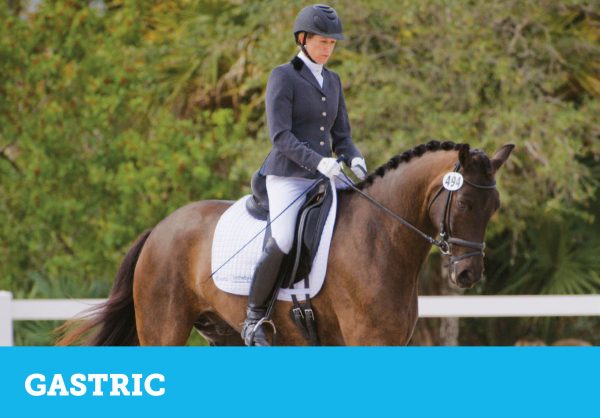
Your horse’s stomach was designed to continuously produce acid to aid in digestion. It’s this constant production of acid, combined with the infrequent meals many horse owners feed for convenience’s sake, that make gastric issues so common.
Your horse’s stomach is covered with two types of lining: glandular mucosa and non-glandular (squamous) mucosa. The glandular mucosa, which contains the glands that constantly produce acid to aid in digestion, covers the bottom two-thirds of the stomach. This region also produces mucus and bicarbonate to help protect the stomach from acid exposure. The non-glandular mucosa covers the top one-third of the stomach. This area is where stomach contents are mixed, usually with buffering from food and saliva, so it doesn’t have as much natural protection from acid. If your horse’s stomach sits empty for long periods of time, excess acid can build up into the unprotected squamous mucosa and eat through the sensitive non-glandular mucosa.
Signs of gastric issues
Because damage to the delicate upper stomach lining is so painful, your horse might display a variety of negative side effects. Some horses go off their feed because large grain meals can increase stomach acid. Other horses may show decreased performance, especially if they’re worked on an empty stomach, as excess acid may splash around and irritate the non-glandular mucosa further. Formerly friendly horses may become cranky while being groomed or tacking up. If you’re concerned your horse may have gastric issues, you should have your veterinarian come out to diagnose your horse and come up with a treatment plan, which may include prescription medication and management changes.
How supplements can help
Gastric health supplements work in three primary ways—by providing ingredients to support the normal structure and function of your horse’s stomach, by serving up ingredients that can help buffer sensitive stomach structures against acid, and by offering ingredients that can help soothe any existing irritation. Since gastric issues are so common, a wide variety of horses may benefit from this type of support on a daily basis.
Ingredients to look for
Calcium and magnesium: These two macrominerals can help neutralize excess stomach acid.
Glycine: This amino acid has been shown to inhibit gastric secretions and protect gastric mucosa against stress.1
Glutamine: This amino acid plays a critical role in the repair of intestinal tissues, including your horse’s stomach lining.
Pectin: This structural carbohydrate has many benefits for horses, including protecting the stomach against gastric lesions.2
Lecithin: This fatty substance has been shown to protect gastric tissue in several animal species, including horses, by supporting the stomach’s defense systems in two ways. First, it forms a barrier between stomach contents and epithelial cells, and second, it helps with cell membrane turnover and wound resealing.2
Sea buckthorn: The berries of the sea buckthorn shrub provide a wide range of compounds whose antioxidant and immune-modulatory properties assist in normal GI tissue healing and repair. Research has shown that this ingredient may help prevent stomach ulcers in horses who are stalled and undergoing intermittent feeding.3
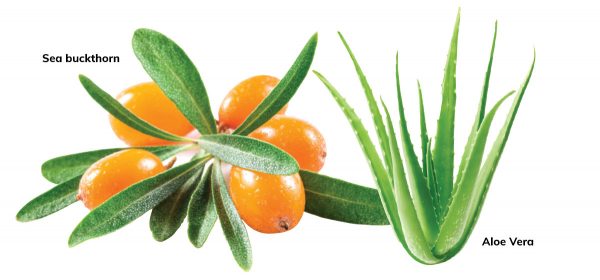
Aloe vera: The gel inside aloe vera leaves has a demonstrated effect on GI tissue,4 most likely due to antioxidant and cell-protective properties.
Licorice: One of the most widely used herbs for people and animals, licorice is used for its action on inflammation, healing, and gastric upset.5
Choosing the right gastric supplement for your horse
Whether your horse has had previous stomach problems, or is exposed to risk factors such as training, travel, large infrequent meals, or other stress, it’s a smart choice to provide him with a daily gastric health supplement. If your horse needs basic support to help maintain his stomach health, choose a formula that has a few key ingredients at low to moderate levels. If your horse is under stress from training, competing, traveling, and/or living in a stall or has occasional gastric problems, look for a supplement that includes a comprehensive selection of ingredients at higher levels.

– The convenient way to give aloe vera
– Helps neutralize excess gastric acid
– Gastric support backed by research

When we developed our patented SmartGut® Ultra Pellets formula, we partnered with the leading gastric health researcher, Dr. Frank Andrews of Louisiana State University, to conduct a clinical research study.
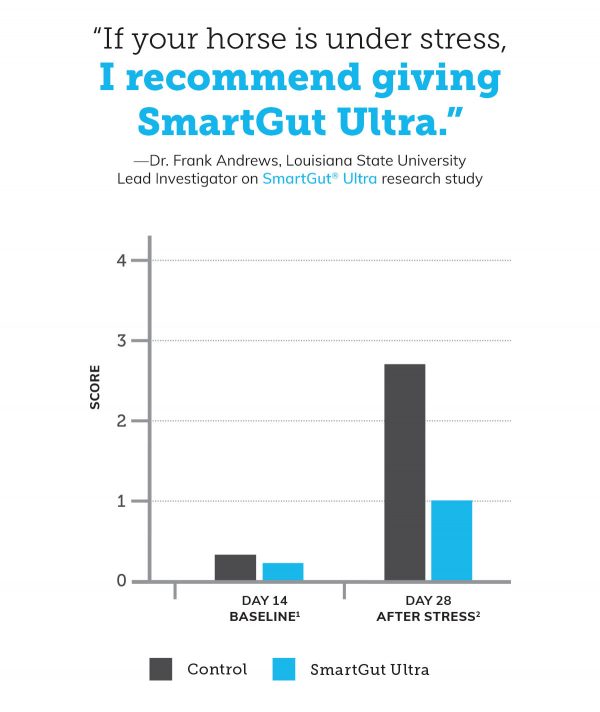
Study Methods
A blinded, two-period crossover study was performed. During the first 14 days, both the control group and test group received GastroGard® to establish a healthy baseline stomach. Between days 14 and 28, the control group received a placebo while the test group received SmartGut Ultra. During that time period, both groups of horses were exposed to stress, including stall confinement.
Study Results
The control group had significantly higher scores on day 28, which represents declining stomach health. As a result, the researchers concluded that SmartGut Ultra helped maintain stomach health
in horses under stress.
Learn more at SmartPak.com/SGUResearch
Graph footnotes:
– All horses were given GastroGard® from Day 1–14 in order to start with a healthy stomach.
– Stress included stall confinement and rebound acid production associated with discontinuing GastroGard.
SOURCE: Excerpted from a blinded, two-period crossover study conducted by Dr. Frank Andrews, Louisiana State University.
Find the Research
- Zhong Z, Wheeler MD, Li X, et al. L-glycine: a novel anti-inflammatory, immunomodulatory, and cytoprotective agent. Curr Opin Clin Nutri Metab Care. 2003 Mar;6(2):229-40.
- Venner M, Lauffs S, Deegan E. Treatment of gastric lesions in horses with pectin-lecithin complex. Equine Vet J Suppl. 1999 Apr;(29):91-6.
- Huff NK, Auer AD, Garza F Jr, Keowen ML, Kearney MT, McMullin RB, Andrews FM. Effect of sea buckthorn berries and pulp in a liquid emulsion on gastric ulcer scores and gastric juice pH in horses. J Vet Intern Med. 2012 Sep-Oct;26(5):1186-91.
- Avijgan M, Kamran A, Abedini A. Effectiveness of aloe vera gel in chronic ulcers in comparison with conventional treatments. Iran J Med Sci. 2016 May;41(3Suppl):S30.
- Aly AM, Al-Alousi L, Salem HA. Licorice: a possible anti-inflammatory and anti-ulcer drug. AAPS PharmSciTech. 2005 Sep 20;6(1):E74-82.
